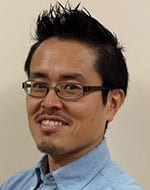Tuesday, 16 April 2019
16:30-18:30
IF3-Fogonomics for the Next Generation IoT Services
Wednesday, 17 April 2019
11:00-13:00
IF4-Analytics and AI for Industrial IoT
14:00-16:00
IF5-GS-IoT: Geo-Spatial IoT for Industrial Applications
Industry Forums Co-Chairs
Yoshihiro Ohba, Toshiba
Chungmin Chen, Iconnective
IF2-Fog Computing and Networking: Key Enablers for Emergent IoT Services and Applications in 5G/6G Environment
Date: Tuesday, 16 April 2019
Time: 14:00-16:00
Room: C1058
Organizers: Dr. Russell Hsing, OpenFog Consortium and Kaushik Pillalamarri, Smartiply
The Industry Panel shall cover both the Future Research Direction as well as Technology Commercialization for entrepreneurs leveraging Fog Computing and Networking. Panel members shall discuss road blocks and challenges with a view into mitigating strategies for 6G wireless in the future. Case studies on select next generation emerging IoT services shall be presented by notable invited speakers from both high-tech startups and academia from across Europe, Asia and US. The following topics shall be covered by the panel:
- OmniEyes: A Fog-based AI Platform for Interconnected Mobile Cameras
- Proximity-based Fog / Edge-based Intelligent Computing Platform
- Fog Computing for Robotics and Industrial Automation
- The Future Power-Edge Platform for the Smart Grid
- Fog-enabled Intelligent IoT Services
- Fog-based Machine Learning Platform for Video Analytics and Acoustic Monitoring Applications
Panelists:
Prof. Nicola Dragoni, Technology University of Denmark
Prof. Hong Wen, University of Electronic Science and Technology in China (UESTC)
Prof. Chunting Chou, National Taiwan University, Taiwan
Dr. Piotr Szczechowiak, Zylia, Poland
Prof. Ming-Tuo Zhou, ShanghaiTech University, China
Organizers
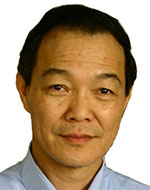 T. Russell Hsing, Board Member of OpenFog Consortium and Professor of National Chiao-Tung University, Taiwan
T. Russell Hsing, Board Member of OpenFog Consortium and Professor of National Chiao-Tung University, Taiwan
T. Russell Hsing is IEEE Life Fellow and Fellow for the British Computer Society and SPIE. He accumulated rich R&D experience of 40 years as technical staff, research director and executive director through affiliations with Burroughs, Xerox, GTE Labs, and Bellcore/Telcordia/Ericsson prior to March 2012. He is now Chair Professor with the National Chiao Tung University in Taiwan, and also has been a visiting / adjunct professor at numerous universities in US, Singapore, China, India, Hong Kong, and Korea since March 2012. He has been driving technology commercialization through joint business ventures and academic spinoffs. He is the advisory council member for the Harvard Business Review (HBR) and attended executive education programs from MIT Salon School and Stanford Business School. Currently he also serves as board member / board advisor / mentor for several academic spin-offs (such as Smartiply and Datami) and served as a board member at the Open Fog Consortium in 2016-2018. He has taught several popular courses such as “Technology Entrepreneurship: From IP to IPO” (since 2014) and “Internet Economics” (since 2017) and has been active as an IEEE ComSoc volunteer for over 30 years. He has served on many committees (including IEEE Fellow Evaluation Committee, IEEE Kiyo Tomiyasu Award Committee, and IEEE Eric Sumner Committee). Most recently he led an Ad Hoc Committee to Review the IEEE Fellow Evaluation Criteria and Process since June 2015, and then made final recommendations to the Board of Governors for the IEEE ComSoc in December 2017.
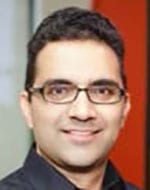 Kaushik Pillalamarri, Co-Founder, Chairman and CEO, Smartiply, Inc. (US)
Kaushik Pillalamarri, Co-Founder, Chairman and CEO, Smartiply, Inc. (US)
Kaushik Pillalamarri is a versatile business and technology leader with 20+ years of global experience across Telecom, CPG, Airline, and Power industries. Previously, Kaushik was the Group CEO for Universal Industries, Ltd., Southern Africa, and the SVP of Data and Devices & Emerging Businesses at Reliance Communications, India. Kaushik has had a rewarding career at Verizon spanning 14 years. He is the Chairman, CEO, and Co-founder of Smartiply, Inc., an
academic spin-off that creates innovative solutions for IoT industry, and that earned recognition from the CIOReview magazine for “20 Most Promising IoT Solution Providers 2018” and also won the 2018 Aegis Graham Bell Award for “Most innovative telecom product of the year.” Kaushik has an MBA in Entrepreneurship from SMU, USA; BS & MS in Computer Science from KSU, USA, and Executive Education from Sloan & Wharton, USA.
Talk Title: Driving IoT Adoption Through Fog Computing and Networking Platform
Rapid growth in connected devices and video content consumption puts additional strain on the network and cloud resources, negatively impacting the customer experience. With an abundance of computing resources available at the network-edge, specifically the end-user edge devices, there is a significant opportunity for innovative cloud-dependent and cloud-less applications that can be enabled that have never been imagined before. Smartiply has developed and launched a platform to seize this opportunity and become a pioneer in this space.
IF3-Fogonomics for the Next Generation IoT Services
Date: Tuesday, 16 April 2019
Time: 16:30-18:30
Room: C1058
Organizer: Prof. Jianwei Huang, Chinese University of Hong Kong and Prof. Ai-Chun Pang, Department of Computer Science and Information Engineering, National Taiwan University
With the development of the Internet of Things technology, connected devices will generate an increasing amount of data every single day. It becomes a big challenge to analyze and create actionable information from the data. Fog computing, as a promising solution to extend the capability of Clouds, has attracted considerable attention. Fogs are lightweight distributed technology platforms. To improve efficiency and reduce the amount of data transported to the cloud for processing, analysis, and storage, it extends cloud computing and services to the edge of the network, bringing the advantages and power of the cloud closer to where data is created and acted upon. Fog computing aims to create a smart environment with networked devices, which distributes computing, storage, control, and networking functions in the most logical, efficient place between the data source and the cloud. To successfully build upon, integrate with, or create a fog environment requires an understanding of its common inner mechanics, architectural layers, and models, as well as an understanding of the business and economic factors that result from the adoption and real-world use of fog-based services. The panel shall focus on the business and economic aspects of fog computing and networking, also known as Fogonomics. The discussions, however, will be deeply rooted in the technology aspects of fog networks. We will talk about the roadblocks and challenges of designing effective and lightweight economic mechanisms and business models, for incentivizing distributed cooperation among fog-based devices and providing predictable fog-based services. Case studies will be presented by top researchers from leading academic institutions in Europe, Asia, and US. The following topics shall be covered by the panelists:
- Pricing mechanisms for fog resource sharing
- Auctions and contract design of fog resources
- Bargaining-based fog resource sharing
- Incentive schemes for energy-efficient fog computing
- Benefits and challenges in collaborative fog analytics
- Fog computing and machine learning applications: lessons from first experiments
Speakers:
Hanna Bogucka, Professor and Department Head, Department of Wireless Communication, Poznan University of Technology
George Iosifidis, Assistant Professor, School of Computer Science and Statistics, Trinity College Dublin, the University of Dublin
Rui Tan, Assistant Professor, School of Computer Science and Engineering, Nanyang Technological University, Singapore
Organizers
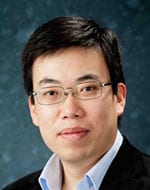 Jianwei Huang, Presidential Chair Professor and Associate Dean, School of Science and Engineering, the Chinese University of Hong Kong, Shenzhen
Jianwei Huang, Presidential Chair Professor and Associate Dean, School of Science and Engineering, the Chinese University of Hong Kong, Shenzhen
Jianwei Huang is a Presidential Chair Professor and Associate Dean, School of Science and Engineering, the Chinese University of Hong Kong, Shenzhen. He is an IEEE Fellow, a Distinguished Lecturer of IEEE Communications Society, and a Clarivate Analytics Highly Cited Researcher in Computer Science. He is the co-author of 9 Best Paper Awards, including IEEE Marconi Prize Paper Award in Wireless Communications in 2011. He has co-authored six books, including the textbook on “Wireless Network Pricing.” He has served as an Associate Editor of IEEE Transactions on Mobile Computing, IEEE/ACM Transactions on Networking, IEEE Transactions on Network Science and Engineering, IEEE Transactions on Wireless Communications, IEEE Journal on Selected Areas in Communications – Cognitive Radio Series, and IEEE Transactions on Cognitive Communications and Networking. He has served as an Editor of Wiley Information and Communication Technology Series, Springer Encyclopedia of Wireless Networks, and Springer Handbook of Cognitive Radio. He has served as the Chair of IEEE ComSoc Cognitive Network Technical Committee and Multimedia Communications Technical Committee. He is the recipient of IEEE ComSoc Multimedia Communications Technical Committee Distinguished Service Award in 2015 and IEEE GLOBECOM Outstanding Service Award in 2010.
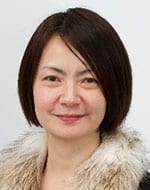 Ai-Chun Pang, Professor, Department of Computer Science and Information Engineering, National Taiwan University
Ai-Chun Pang, Professor, Department of Computer Science and Information Engineering, National Taiwan University
Ai-Chun Pang is is a Professor in the Department of Computer Science and Information Engineering and Associate Dean of the College of Electrical Engineering and Computer Science (EECS) at the National Taiwan University (NTU). She was the director of Graduate Institute of Networking and Multimedia (INM) in 2013-2016. Her research interests include wireless and multimedia Networking, 5G communications, software defined networking, ultra-low latency communications for wireless networks, and fog/edge computing for next generation IoT services. She is a co-author of the book “Wireless and Mobile All-IP Networks” published by Wiley (2005). She is a Guest Editor of IEEE Transactions on Vehicular Technology (TVT) Special Issue on “Fog/Edge Computing for Autonomous and Connected Cars”, and is an Associate Editor of IEEE TVT, IEEE Transactions on Green Communications and Networking, and ACM Transactions on Cyber-Physical Systems. She is a senior member of IEEE, and a Distinguished Lecturer of IEEE Vehicular Technology Society (VTS).
Speakers
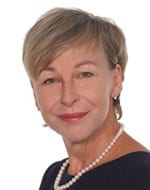 Hanna Bogucka, Professor and Department Head, Department of Wireless Communication, Poznan University of Technology
Hanna Bogucka, Professor and Department Head, Department of Wireless Communication, Poznan University of Technology
Hanna Bogucka a full professor and the Wireless Communication Department Head at Poznan University of Technology. Prof. Bogucka is involved in the research in the area of radio communication: radio resource management, opportunistic radio access, flexible, adaptive and cognitive radio. She is the team leader implementing a number of projects funded by European Union, National Science Centre and by the industry. Prof. Bogucka is the author of 180 research papers. She has also published 3 handbooks in the area of radio communications and digital signal processing (in Polish) and 3 scientific monographs on flexible and cognitive radio. Prof. Bogucka has been the member of the IEEE Kiyo Tomiyasu Award Committee in the term of 2012/13 and 2013/14, appointed IEEE Communications Society Director of the EAME Region (Europe, Africa, Middle East) and the Board of Governors member for 2014-2015 term, and elected IEEE Radio Communications Committee Chair for the term of 2015-2016. Currently, she is the member of IEEE Awards Board, Executive Editor of Wiley Transactions on Emerging Telecommunications Technologies and the member of the Polish Academy of Sciences.
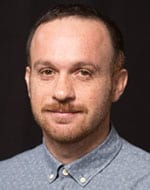 George Iosifidis, Assistant Professor, School of Computer Science and Statistics, Trinity College Dublin, the University of Dublin
George Iosifidis, Assistant Professor, School of Computer Science and Statistics, Trinity College Dublin, the University of Dublin
George Iosifidis received the Diploma degree in electronics and communications from the Greek Air Force Academy, Athens, in 2000; and the Ph.D. degree in 2012 from the Department of Electrical and Computer Engineering, University of Thessaly, Greece. He was a Post-Doctoral Researcher with CERTH-ITI, Greece, from 2012 to 2014, and a Post-Doctoral/Associate Research Scientist with Yale University from 2014 to 2017. He has worked also as an avionics and quality assurance engineer for 12 years. He is currently the Ussher Assistant Professor in Future Networks with the School of Computer Science and Statistics, Trinity College Dublin, and a Funded Investigator with the SFI research center CONNECT. He was a co-recipient of the Best Paper Awards in WiOPT 2013 and the IEEE INFOCOM 2017 conferences, a guest editor for the IEEE JSAC Special Issue on Caching, and has received an SFI Career Development Award in 2018. His research interests lie in the broad area of network optimization and economics, with a recent focus on edge computing, sharing economy platforms, and the Internet of Things.
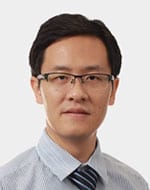 Rui Tan, Assistant Professor, School of Computer Science and Engineering, Nanyang Technological University, Singapore
Rui Tan, Assistant Professor, School of Computer Science and Engineering, Nanyang Technological University, Singapore
Dr. Rui Tan is an Assistant Professor at School of Computer Science and Engineering, Nanyang Technological University. Previously, he was a Senior Research Scientist at Advanced Digital Sciences Center, a Singapore-based research center of University of Illinois at Urbana-Champaign, and a postdoctoral Research Associate at Michigan State University. He received PhD degree from City University of Hong Kong. His research interests include sensor networks, Internet of things, and cyberphysical systems. He is the recipients of IPSN’17 and CPSR-SG’17 Best Paper Awards, IPSN’14 and PerCom’13 Best Paper Award Runner-Ups, and CityU Outstanding Academic Performance Award. He is a Senior Member of the IEEE.
IF4-Analytics and AI for Industrial IoT
Date: Wednesday, 17 April 2019
Time: 11:00-13:00
Room: C1058
Organizer: Ken Hatano, Toshiba
It is said that AI is in the third wave now because of the rapid increase of data by IoT and the Deep Learning technology. IoT technology helps collecting the data from sensors, production machinery, and even human activity in Industrial IoT (IIoT), processing the collected data to visualize what’s happening in the real world (Digital Twin / Digital Transformation). And lastly, analyzing the data to provide insights to the stakeholders is the part AI works. However, the customers’ excessive expectation toward AI that “AI can solve so much problems” causes their easy and innocent request saying, “We have data and we just want you to improve our business by using AI!” This kind of unsatisfied expectation could ruin the AI’s potential. We all need the right understanding of Analytics and AI for IIoT and its challenges, in from fundamental to advanced level. In this panel, panelists will introduce and discuss the challenges and interest viewpoints many stakeholders face to build AI solutions on IIoT domain. Topics includes AI engine’s right and obligation, AI’s uncertainty, the challenges for open AI/IoT system, well used AI use cases, , etc.
Panelists:
Javier Diaz, CTO, Aingura IIoT
Hans Peter Graf, Head of Machine Learning Research Department, NEC Laboratories America
Thomas Hahn, Chief Software Expert, Siemens AG
John Kennedy, Principal Investigator, Orchestration and Control Research Lab, Intel Labs Europe
Organizer
Ken Hatano is Chief Specialist in. He started his career on embedded system firmware development, including Web DVD player, ADSL WiFi Router. He studied information networking in the US. After developing BIOS on Toshiba’s laptop PC in Japan, he lived in Seattle to work with Microsoft for more than 3 years. Back to Japan again, started working on cloud and AI solution. Now, he focuses on strategic alliances by exploring partnerships to better leverage Toshiba’s AI/IoT solutions. He works as use case lead of the OpenFog Consortium. He has extensive ICT (information and communications technology), software development, cloud and AI experience. He has a Bachelor of Science degree in computer science, a master’s degree in computational intelligence and systems science from Tokyo Institute of Technology, along with a master’s degree in information networking from Carnegie Mellon University.
Panelists
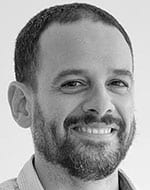 Javier Diaz, CTO, Aingura IIoT
Javier Diaz, CTO, Aingura IIoT
Javier Diaz is CTO in Aingura IIoT, where he leads the different departments of engineering, software, hardware and data analytics to ensure the correct functioning of IIoT technology, from the origin of the data to its conversion into added value. He is also the main representative for the company at the Industrial Internet Consortium where is the co-lead for the Testbed “Smart Factory Machine Learning for Predictive Maintenance”. Javier has more than 15 years of industrial experience working in different positions related to research and development. As project manager in Ikergune (R&D Unit of the Etxe-Tar Group), he led the development line of IIoT, which has allowed to generate the company Aingura IIoT. Javier obtained an M.Eng. degree in Mechanical Engineering and a M.Sc. degree in Advanced Manufacturing Technology and Systems Management from UMIST at UK. He is currently a PhD candidate in Artificial Intelligence at the Technical University of Madrid.
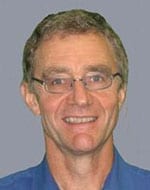 Hans Peter Graf, Head of Machine Learning Research Department, NEC Laboratories America
Hans Peter Graf, Head of Machine Learning Research Department, NEC Laboratories America
Hans Peter Graf is head of the machine learning research department at NEC Laboratories America in Princeton. The department develops machine learning algorithms, as well as a range of applications in semantic text analysis, cognitive video interpretation and bio-medical analysis. His responsibilities include technology transfer to business units and the commercialization of research results. An example is the recently released e-Pathologist, a system assisting pathologists with the interpretation of histological samples, which contains key algorithms developed by the department. Before joining NEC Laboratories, Hans Peter was a Distinguished Member of Technical Staff at Bell Laboratories and AT&T Laboratories where he developed neural net models and machine learning applications. Massively parallel neural net processors of his design were key parts in high-speed address readers and check processing systems. Hans Peter received a Diploma and a PhD, both in physics, from the Swiss Federal Institute of Technology in Zurich, Switzerland. He is author or coauthor of over 100 reviewed articles and some 40 issued patents. He is a Fellow of the IEEE and a member of the American Physical Society.
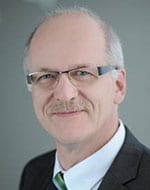 Thomas Hahn, Chief Software Expert, Siemens AG
Thomas Hahn, Chief Software Expert, Siemens AG
Thomas Hahn was born in 1960, has been Chief Software Expert at Siemens AG since 2011. After studying computer science at Friedrich-Alexander University of Erlangen he joined the company in 1986 and worked as a product developer in the field of industrial networks in Erlangen. In 1993 he moved to Nuremberg, where he worked in product management for SIMATIC and as a project manager responsible for development of SIMATIC STEP 7. From 1997 he worked as Head of Development at Traffic Control Systems in Munich for two years. In 1999 he returned to Nuremberg, where he was Head of Software Development for Industrial Automation Systems. He held this post until 2011. In addition to his function as Chief Software Expert, he was Head of the Business Analytics and Monitoring technology field from 2011 to August 2013. Beyond his activities at Siemens, Thomas Hahn is a member or board member of various bodies, including the OPC Foundation, Big Data Value Association, Openlab CERN and Platform Industrie 4.0.
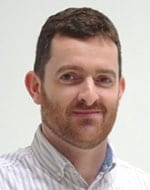 John Kennedy, Principal Investigator, Orchestration and Control Research Lab, Intel Labs Europe
John Kennedy, Principal Investigator, Orchestration and Control Research Lab, Intel Labs Europe
John Kennedy is a principal investigator in the Orchestration and Control Research Lab of Intel Labs Europe. Focusing on dependable cyber-physical systems, John directs research towards self-tuning edge systems and systems-of-systems in the industrial domain. John joined Intel in 1997 as an automation engineer and before his current focus on edge systems was responsible for research in cloud orchestration, manageability, interoperability and dependability. He has been active in many collaborative research initiatives in bilateral, national and European consortia tackling challenges such as machine-readable SLAs, virtualized I/O, full-stack telemetry and systems manageability. He has also represented Intel in cloud standards organisations and initiatives including ISO IEC/JTC1 SC38 Cloud Computing and Distributed Platforms, and ETSI CSC Cloud Standards Coordination. John has a B. Eng. (hons) in Electronic Engineering and M. Sc. in Computing.
IF5-GS-IoT: Geo-Spatial IoT for Industrial Applications
Date: Wednesday, 17 April 2019
Time: 14:00-6:00
Room: C1058
Organizer: Dr. Fearghal O’Donncha, Research Scientist, IBM Research Ireland
The world has extensive land and water resources that are essential for food supplies and industrial applications. It also has densely populated cities that pollute the air and water flowing through them, affecting vast territories beyond. In the last decade, it has become increasingly clear that monitoring and managing these remote regions is essential for our sustained growth and security, and that only autonomous and smart sensors can cover enough space to do what is needed. This panel will discuss several research programs that combine remote sensing and geo-spatial analytics to monitor and manage soil and water quality, greenhouse gas emission from cities, production quality for agriculture and aquaculture, remote pipelines, vegetation overgrowth, and disaster response. The speakers are key innovators in these fields. A new type of database designed for rapid and scalable archiving, retrieval, and analysis of multi-scale geo-spatial-temporal information will also be discussed.
Speakers:
Dr. Levente Klein, Research Staff Member, IBM Research Yorktown NY
Professor Supratik Guha, Professor, Institute for Molecular Engineering, Argonne National Laboratory and Director, Center for Nanoscale Materials, The University of Chicago
Professor Paul Shepson, Dean of the School of Marine and Atmospheric Sciences, Stony Brook University
Dr. Blair Edwards, Group Leader, Data Science, IBM Research Warrington UK
Professor Jonathan Grant, Professor, Department of Oceanography, Dalhousie University Nova Scotia
Organizer
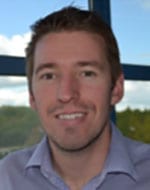 Dr. Fearghal O’Donncha, Research Scientist, IBM Research Ireland
Dr. Fearghal O’Donncha, Research Scientist, IBM Research Ireland
Fearghal O’Donncha is a Research Scientist at IBM Research – Ireland. His work focuses on applying simulation models, analytics and machine learning techniques to assist industry operations. This encompasses developing and deploying simulation-based models that describe pertinent conditions and operation, integrating sensor data from a variety of IoT platforms, developing AI based models that extract value from sensor or expert data, and optimising these tools to a variety of HPC and Cloud based platforms. Current research interests relate to integrating IoT and AI to support the aquaculture industry, and deep learning based models to augment computationally expensive physics-based models. He has extensive expertise in large scale modelling and data assimilation particularly applied to real time marine operations for coastal and marine operations. Fearghal is an adjunct faculty member at the National University of Ireland, Galway (NUIG).
Speakers
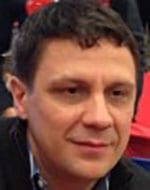 Dr. Levente Klein, Research Staff Member, IBM Research Yorktown NY
Dr. Levente Klein, Research Staff Member, IBM Research Yorktown NY
Dr. Levente Klein is a Research Staff Member in the Internet of Things and Industry solutions at the IBM T.J. Watson Research Center, Yorktown Heights, NY. His work at IBM spans multiple research topics from materials science, nano-optics, and wireless sensing solutions, with a strong focus to apply research technologies to industrial problems. Since joining IBM Research in 2006, he developed technologies to enable energy efficient cooling in data centers, monitor fugitive methane gas in the oil and gas industry, and apply wireless sensing to agriculture and healthcare. Current research interests focus on environmental monitoring of greenhouse gases, application of wireless sensing in outdoor environments, and physics-based modeling and analytics. His work was recognized by three IBM Outstanding Technical Achievement Awards and multiple IBM Research Division Awards. He has published more than 50 scientific papers and has 40 patents granted in the USA.
Talk Title: Sensing the Vast Expanse of Nature: Pipelines, Vegetation, and Natural Disasters with the PAIRS Geo-Spatial Database
Geospatial data is essential to contextualize and enrich the information acquired by sensors, actuators, and mobile devices. Combining sparse sensor data with global satellite imagery requires new processing and data management tools, enabling new industrial applications like real-time large infrastructure monitoring on a continental scale that was not possible a few years back. New emerging applications range from oil and gas pipeline observations, vegetation management, and natural disaster monitoring with unprecedented spatial and temporal resolution. Managing efficiently PetaBytes of data and spatial temporal analytics on real-time streams of sensors, satellites, and social media require specialized algorithms and big data techniques. Lessons learned from developing a big data platform called PAIRS-Geoscope will be discussed along with challenges to operationalize and run analytics in real time.
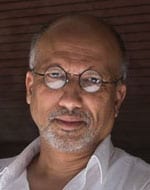 Professor Supratik Guha, Professor, Institute for Molecular Engineering, Argonne National Laboratory and Director, Center for Nanoscale Materials, The University of Chicago
Professor Supratik Guha, Professor, Institute for Molecular Engineering, Argonne National Laboratory and Director, Center for Nanoscale Materials, The University of Chicago
Supratik Guha is the director of the Center for Nanoscale Materials at Argonne National Laboratory, and a Professor at the Institute for Molecular Engineering at The University of Chicago. He is also the Senior Scientific Advisor to the Director at Argonne. Dr. Guha came to The University of Chicago and Argonne in 2015 after spending twenty years at IBM Research where he last served as the Director of Physical Sciences. Dr. Guha’s interests lie in the area of new materials and systems for information processing. He is a member of the National Academy of Engineering and a Fellow of the Materials Research Society, American Physical Society, a 2018 Department of Defense Vannevar Bush Faculty Fellow. He received his Ph.D. in materials science in 1991 from the University of Southern California, and a B.Tech in 1985 from the Indian Institute of Technology, Kharagpur.
Talk Title: Soil and Water Quality Sensing Networks
The affordability of computing today, progress in nanomaterials and sensing devices, the increasing availability of data, and the emergence of low power wireless networks have made this an opportune time for the emergence of geospatial sensor networks for water and soil science. I will discuss two projects at different stages of development: (i), the development of Thoreau (Thoreau.uchicago.edu)-the first university based fully sub-terranean sensing network for soil that we have built at the University of Chicago, and (ii) a pilot project on temporal and geospatial mapping of water quality in rivers across India. I will also describe a few of the key challenges for such sensing networks, which includes development of cheap, reliable, and scalable sensing packages, and relating the scientific results for social impact.
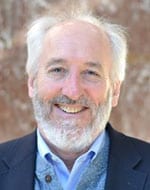 Professor Paul Shepson, Dean of the School of Marine and Atmospheric Sciences, Stony Brook University
Professor Paul Shepson, Dean of the School of Marine and Atmospheric Sciences, Stony Brook University
Paul Shepson was born and raised in Elmira, N.Y., a child of the Finger Lakes. He is an atmospheric chemist and is currently Dean of the School of Marine and Atmospheric Sciences at Stony Brook University. From 2014 – 2018, he served as Director of the Division of Atmospheric and Geospace Sciences at the National Science Foundation, as a “rotator”, on leave from Purdue University, where he has been the Jonathan Amy Distinguished Professor of Chemistry, and Earth, Atmospheric, and Planetary Sciences. At Purdue he was also the founding Director of the Purdue Climate Change Research Center. Professor Shepson’s research focuses on exchange of gases between the surface and the atmosphere in a variety of environments and involves building unusual platforms including tethered balloons, ice-tethered buoys, and his group’s aircraft, the Airborne Laboratory for Atmospheric Research. He is passionate about understanding and communicating about climate change and its impacts and related constructive problem solving.
Talk Title: City Sensing Networks for Greenhouse Gas Emission
At the present time, 57% of humans live in urban environments, and 70% of greenhouse gases (GHGs) are emitted in urban environments. Because these numbers will increase significantly over the coming decades, greenhouse gas emission mitigation will likely be managed at the urban scale. Indeed, cities around the world have been making aggressive commitments (e.g. via the C40 Cities network) to GHG strategies and with temporally-specific reduction objectives. As typical examples, New York City has committed to an 80% reduction in emission rates by 2050. London has an extremely aggressive policy that commits to a 60% reduction in emissions (relative to 1990) by 2025. While such commitments exist, and legislation aimed at codifying them are in development, the means to independently and objectively assess progress has not been well-established. For the past ten years we (and others around the world) have been working on developing reliable and high-precision methodologies for measurement of urban scale emission rates, focusing on carbon dioxide and methane. While there are a variety of approaches that have been pursued, most of the published work has relied in Bayesian inversions from tower-based network observations. As low-cost sensor technology improves, cities are likely to install high-density sensor networks, making this approach much more routine and prevalent. In this talk I will discuss the state-of-the science, and present results from various urban networks of GHG sensors. Those networks provide a scientific link to the very large observational data sets from orbiting satellites, such OCO-2.
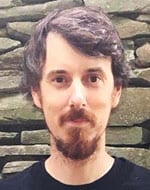 Dr. Blair Edwards, Group Leader, Data Science, IBM Research Warrington UK
Dr. Blair Edwards, Group Leader, Data Science, IBM Research Warrington UK
Dr Blair Edwards leads the IBM Research Data Science team at the Hartree Center, Daresbury (UK). As an IBMer, Blair’s focus is on the application and utility of Big Data, Internet of Things and AI technologies in a range of industries, including agriculture, manufacturing, healthcare, transport and telecommunications. His group’s current focus areas are big geospatial data and process analytics, as well as looking ahead to the challenges surrounding future massive data workflows. Blair’s team has collaborated with a number of organisations to explore the use of geospatial data (and other types of big data) and A.I. in the agricultural sector, both in the UK and the wider world. This includes a focus on integrating a range of datasets from different sources to enable researchers to develop more holistic systems-based models of the agricultural system.
Talk Title: Sensing, Analytics and Geo-Spatial Big-Data for Agriculture
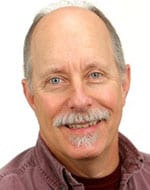 Professor Jonathan Grant, Professor, Department of Oceanography, Dalhousie University Nova Scotia
Professor Jonathan Grant, Professor, Department of Oceanography, Dalhousie University Nova Scotia
Jon Grant is a Professor of Oceanography at Dalhousie University. He is the NSERC-Cooke Industrial Research Chair in Sustainable Aquaculture, beginning a multi-year partnership with Cooke Aquaculture, the largest domestic fish farming company in North America. Trained as a benthic ecologist, he has a BSc from Duke University and PhD from the University of South Carolina. Jon has worked in aquaculture-environment interactions for 30 years and is co-editor of a new book entitled ‘Goods and services of marine bivalves’. Working with both the shellfish and finfish farming industry, Jon has pioneered concepts and tools for assessing carrying capacity in field culture. This work has led to rigorous application of ecosystem-based management and marine spatial planning to aquaculture, including incorporation of ocean technology, remote sensing and GIS. Jon led the development of the Aquaculture theme in the new Ocean Frontier Institute, the largest marine science initiative in Canadian history.
Talk Title: DeepSense for the Canadian ‘Blue’ Economy
Fish farming is an important economic sector in coastal communities, and central in food security for the future. Fish are cultured in a series of enclosed nets moored most often near the coast. Various sustainability issues have arisen in net pen culture in the coastal ocean, making fish farming a controversial use of ocean resources. These include waste management (feces and food), disease transmission, and interaction with wild species and fisheries. Paralleling agriculture, advances in sensor technology have led to the implementation of ‘precision fish farming’ as a means of increasing fish health and welfare and their interaction with the coastal environment. In high latitudes, Atlantic salmon are the primary culture species. Working with both the fish farming (Cooke Aquaculture; cookeseafood.com) and ocean technology industries (RealTime Aquaculture; RTaqua.com), we are collaborating on a network of wireless oxygen and temperature sensors with data transmission to central hubs and the cloud. Since radio waves do not travel well underwater, data transmission is via acoustics, as pioneered by RTAqua. In addition, we have deployed additional acoustic devices to monitor fish movement and behaviour as well as motion of net structures. Hundreds of sensors are deployed in eastern Canada, with additional European networks being established with the Horizon 2020 GAIN program (unive.it/pag/33897). Husbandry aspects of fish farming also generate Big Data including feeding regimes, feed formulation, fish growth, health status, harvest weight, and a host of processing, marketing, sales, and other food production statistics. While these data are vital for farming operations, they are also critical for regulatory compliance and ecocertification standards used in retailing such as traceability.
The DeepSense program (deepsense.ca) is based at Dalhousie University (Nova Scotia) and is a partnership between IBM Canada and the Faculty of Computer Science designed to assist ocean-related industries with Big Data problems. Researchers from Dalhousie Oceanography are collaborating with DeepSense on two central questions: How can Big Data derived from sensor networks be leveraged through deep learning and other analytics to increase economic return via improved fish health, growth and welfare; and how can this information be used in turn to improve social and environmental aspects of sustainability? Our specific research objectives include resolving (a) scales of variation in sensor deployment, (b) management of Big Data and use of data analytics to mine predictions related to fish growth and health, (c) development of additional sensors for understanding the aquaculture ecosystem, and (d) integration of data into coastal information portals and wider metrics of coastal health. Although in a nascent stage, ocean observations are transforming fish farming in terms of economic, social and environmental aspects of sustainability. The addition of DeepSense expertise to the existing collaboration of Cooke-RealTime-Dalhousie is the perfect storm of synergy to implement next generation fish farming.



